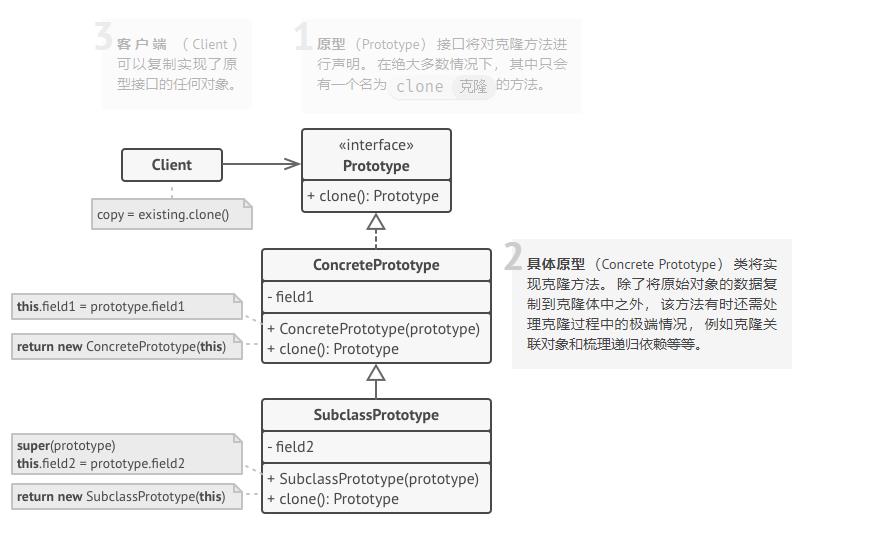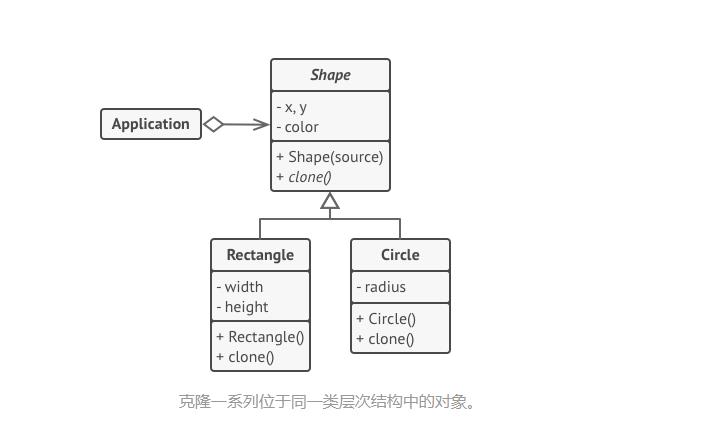# 定义
# 原型是一种创建型设计模式, 使你能够复制对象, 甚至是复杂对象, 而又无需使代码依赖它们所属的类。
所有的原型类都必须有一个通用的接口, 使得即使在对象所属的具体类未知的情况下也能复制对象。 原型对象可以生成自身的完整副本, 因为相同类的对象可以相互访问对方的私有成员变量。
简单来说就是在类上面实现一个clone方法,使其能够管理自身对象的复制功能。
# 结构

# 伪代码

# 示例
# 复制图形
# 1. 定义通用形状接口: prototype.Shape.java
package prototype;
public abstract class Shape {
public int x;
public int y;
public String color;
public Shape() {
}
public Shape(Shape target) {
if (target != null) {
this.x = target.x;
this.y = target.y;
this.color = target.color;
}
}
public abstract Shape clone();
public boolean equals(Object object) {
if (!(object instanceof Shape)) return false;
Shape shape = (Shape) object;
return shape.x == this.x && shape.y == this.y && shape.color.equals(this.color);
}
}
1
2
3
4
5
6
7
8
9
10
11
12
13
14
15
16
17
18
19
20
21
22
23
24
25
26
27
28
29
30
31
32
2
3
4
5
6
7
8
9
10
11
12
13
14
15
16
17
18
19
20
21
22
23
24
25
26
27
28
29
30
31
32
# 2. 简单形状: prototype.Circle.java
package prototype;
public class Circle extends Shape {
public int radius;
public Circle() {
}
public Circle(Circle target) {
super(target);
if (target != null) {
this.radius = target.radius;
}
}
@Override
public Shape clone() {
return new Circle(this);
}
@Override
public boolean equals(Object object) {
if (!(object instanceof Circle) || !super.equals(object)) return false;
Circle circle = (Circle) object;
return circle.radius == this.radius;
}
}
1
2
3
4
5
6
7
8
9
10
11
12
13
14
15
16
17
18
19
20
21
22
23
24
25
26
27
28
29
30
31
2
3
4
5
6
7
8
9
10
11
12
13
14
15
16
17
18
19
20
21
22
23
24
25
26
27
28
29
30
31
# 3. 另一个形状: prototype.Rectangle.java
package prototype;
public class Rectangle extends Shape {
public int width;
public int height;
public Rectangle() {
}
public Rectangle(Rectangle target) {
super(target);
if (target != null) {
this.width = target.width;
this.height = target.height;
}
}
@Override
public Shape clone() {
return new Rectangle(this);
}
@Override
public boolean equals(Object object) {
if (!(object instanceof Rectangle) || !super.equals(object)) return false;
Rectangle rectangle = (Rectangle) object;
return rectangle.width == this.width && rectangle.height == this.height;
}
}
1
2
3
4
5
6
7
8
9
10
11
12
13
14
15
16
17
18
19
20
21
22
23
24
25
26
27
28
29
30
31
32
33
2
3
4
5
6
7
8
9
10
11
12
13
14
15
16
17
18
19
20
21
22
23
24
25
26
27
28
29
30
31
32
33
# 4. 克隆示例: prototype.Demo.java
package prototype;
import java.util.ArrayList;
import java.util.List;
public class Demo {
public static void main(String[] args) {
List<Shape> shapes = new ArrayList<Shape>();
List<Shape> shapesCopy = new ArrayList<Shape>();
Circle circle = new Circle();
circle.x = 10;
circle.y = 20;
circle.radius = 5;
circle.color = "red";
shapes.add(circle);
Circle anotherCircle = (Circle) circle.clone();
shapes.add(anotherCircle);
Rectangle rectangle = new Rectangle();
rectangle.width = 10;
rectangle.height = 20;
rectangle.color = "blue";
shapes.add(rectangle);
cloneAndCompare(shapes, shapesCopy);
}
private static void cloneAndCompare(List<Shape> shapes, List<Shape> shapesCopy) {
for (Shape shape :
shapes) {
shapesCopy.add(shape.clone());
}
for (int i = 0; i < shapes.size(); i++) {
if (shapes.get(i) != shapesCopy.get(i)) {
System.out.println(i + ": Shapes are different objects (yay!)");
if (shapes.get(i).equals(shapesCopy.get(i))) {
System.out.println(i + ": And they are identical (yay!)");
} else {
System.out.println(i + ": But they are not identical (booo!)");
}
} else {
System.out.println(i + ": Shape objects are the same (booo!)");
}
}
}
}
1
2
3
4
5
6
7
8
9
10
11
12
13
14
15
16
17
18
19
20
21
22
23
24
25
26
27
28
29
30
31
32
33
34
35
36
37
38
39
40
41
42
43
44
45
46
47
48
49
50
51
52
53
2
3
4
5
6
7
8
9
10
11
12
13
14
15
16
17
18
19
20
21
22
23
24
25
26
27
28
29
30
31
32
33
34
35
36
37
38
39
40
41
42
43
44
45
46
47
48
49
50
51
52
53
# 5. 输出结构
0: Shapes are different objects (yay!)
0: And they are identical (yay!)
1: Shapes are different objects (yay!)
1: And they are identical (yay!)
2: Shapes are different objects (yay!)
2: And they are identical (yay!)
1
2
3
4
5
6
2
3
4
5
6